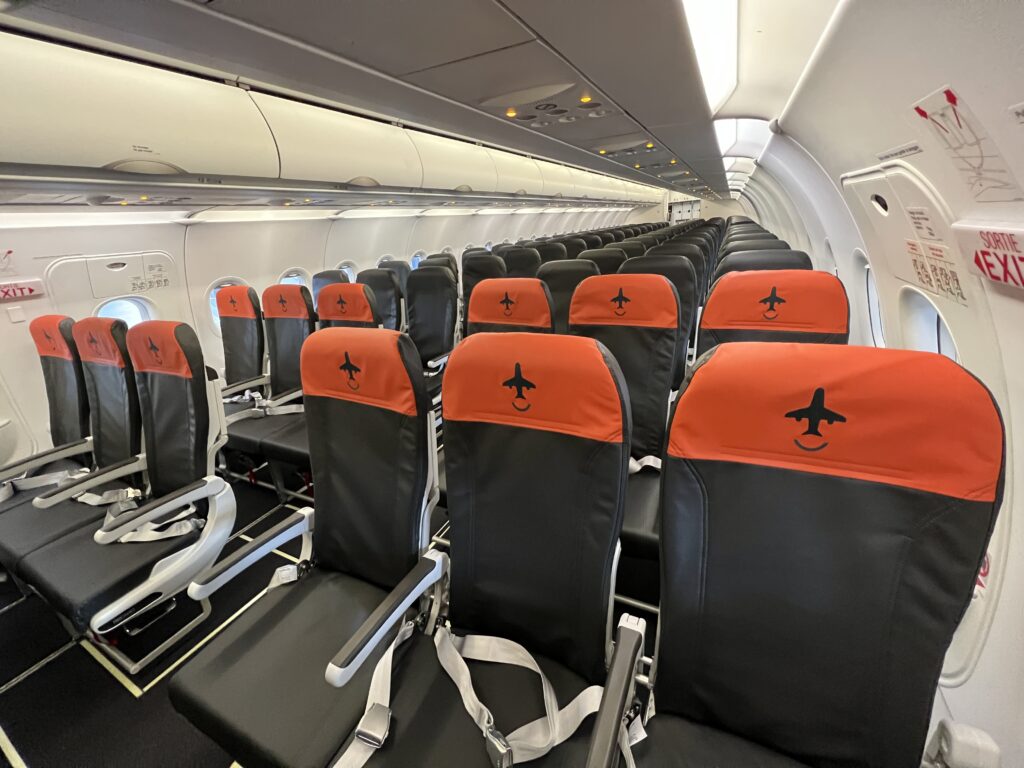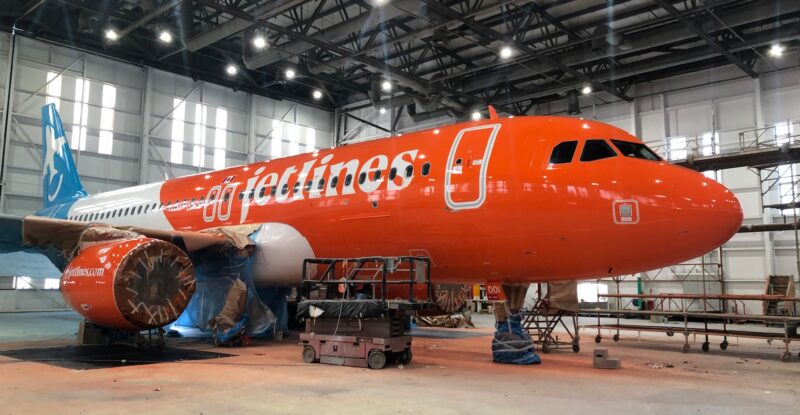Many new entrant airlines have tried to make a go of it in Canada’s cutthroat aviation scene, but few have succeeded in successfully claiming a stake in the market — as most recently underscored by Canada Jetlines’ decision to temporarily ground operations amid a cash crunch.
“Canada Jetlines announced today that it will be temporarily ceasing airline operations effective August 15, 2024,” it said in a published press release, citing an inability to obtain the financing required to continue operations.
“Every effort is being made to assist passengers at this time. Passengers with existing bookings are advised to contact their credit card company to secure refunds for pre-booked travel.”
It said it intends to file for creditor protection.
Oddly, Canada Jetlines does not yet appear to have published a statement on its web site — or indeed its social media accounts — about its cessation of operations on 15 August, though its booking engine shows no flight options.

Headquartered in Mississauga, Ontario, Canada Jetlines operated Airbus A320s. Image: Canada Jetlines
Canada Jetlines is just the latest in a litany of low-cost carriers (LCCs) and ultra-low-cost carriers (ULCCs) that have become Canadian casualties. The market is dominated by Air Canada and WestJet, and is sorely in need of competition, as your author, a Canadian citizen, can attest.
Lynx, we hardly knew ye
Calgary-headquartered Lynx Air, which identified as a ULCC, offered domestic flights using a fleet of Boeing 737 MAX aircraft, and had its sights set on international routes.
The carrier impressed with its intuitive and transparent web site and fee structure. But it ceased operations in February 2024, after only two years of service.
“[T]he compounding financial pressures associated with inflation, fuel costs, exchange rates, cost of capital, regulatory costs and competitive tension in the Canadian market have ultimately proven too steep a mountain for our organization to overcome,” Lynx explained in an online statement.
Ingesting Swoop
Also headquartered in Calgary, Swoop launched service in 2018 and laid claim to having pioneered the ULCC business model in Canada. However, after five years in service, it was absorbed by parent company WestJet and ceased to exist on 28 October 2023.
When asked by Runway Girl Network about WestJet’s plans for providing Canadians with lower fare options, the airline assured that: “Swoop’s highly successful business model will be implemented across WestJet’s operations.” But a quick search on WestJet’s web site today suggests that many of those low fares have gone the way of the dodo bird.
For example, WestJet’s fares for Toronto-Halifax and Toronto-Calgary are presently comparable to Porter Airlines, with just a few dollars difference between them. But Porter, which is based at Toronto’s downtown airport Billy Bishop, offers free wine, beer and premium snacks — plus free Wi-Fi on its new Embraer E195-E2 twinjets! — in economy class.
Air Canada recently added free snacks on some flights to compete with Porter. To date, WestJet has not introduced this perk.
Few might remember NewLeaf. It outsourced the actual carriage of passengers to Flair Airlines and was absorbed by Flair in July, 2017.
Flair is still there
For its part, Flair has managed to stay alive but not without challenges. The Edmonton, Alberta-headquartered carrier faced Canadian ownership questions in spring 2022, but by June of that year, the government had confirmed that Flair is indeed Canadian.
In March 2023, Flair saw four aircraft seized due to non-payment and it cancelled some routes, though it quickly rallied. It is now the third largest airline in Canada after Air Canada and WestJet.
Remarking on the fate of Canada Jetlines, Flair CEO Maciej Wilk said the news “only strengthens Flair’s resolve. We understand our critical role in providing affordable, reliable air travel for Canadians.
“Our commitment to streamlining our operations, innovating in network planning, and maintaining agility in the face of external challenges remains unwavering.”
He added:
Flair’s mission has always been to drive market competition, ensuring Canadians have access to the lowest possible fares. We are more determined than ever to keep that promise. Competition in Canadian aviation is not just important — it’s essential.
Flair has been at the forefront of challenging the Big Two, and we will continue to do so with resilience, dedication, and a clear focus on efficiency.
We will honour the spirit of competition that Canada Jetlines helped foster by continuing to push the boundaries of what’s possible, staying true to our mission, and ensuring that Flair remains a vital choice for travellers across Canada.
Still to come?
Proposed start-up Connect Airlines, which planned to offer transborder services from Toronto Billy Bishop in 2021 with Q400 turboprops, is working towards launching a honed version of premium leisure service sometime this year, though talks are ongoing with the US FAA. Intended destinations include Boston, Chicago and Philadelphia.
Connect is working closely with Canadian charter operator Pivot Airlines, for which it now has partial ownership (PDF). And it ultimately hopes to help decarbonize regional travel.
“Connect’s bright future includes in just a few years the introduction of hydrogen-fueled, zero-emission passenger aircraft that will transform the regional airline market and allow for smarter, greener travel. Pivot will be a core component of Connect’s hydrogen aircraft plans,” Connect CEO John Thomas told RGN.
We wish it godspeed.
What is clear about the aforementioned recent carnage in Canadian aviation is that Canadians have fewer options for air travel. And that’s unfortunate, no matter which way you slice it.
Featured image credited to Canada Jetlines















